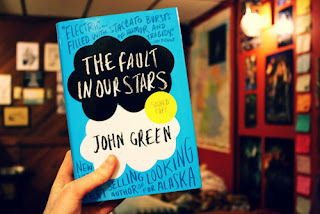Thoughts in bits and pieces II- The Fault in our Stars

One of the innate and visceral human needs is the need to be remembered, to be missed, to be not-forgotten with the passage of time.
Every person wishes to be remembered by at least one person after he or she ceases to exist on the earth. Fear of death is fear of the unknown, but a large part of it is the fear of being forgotten- that you once walked and talked on this land. The very thought is weirdly painful.
I can vaguely imagine the pain the family of a dementia or Alzheimer's' patient goes through. Every single day having to acknowledge the fact that the person who matters so much to you, no longer recognises you. It's sad and depressing.

Reading John Green's 'The Fault in our stars' is depressing too. It's excruciatingly slow tragedy- pain comes slowly- rather than coming all of a sudden and drowning you in tears, suffocating your dreams and optimism for just one day, it comes gradually, seeping into your body and mind and heart, and staying there making you feel depressed. I have already cried a lot- just 60 pages short of finishing the book. Even though the book is a work of fiction, in some way it screams reality. I know this is the best honest tragedy that i have read so far.
Augustus Waters and Hazel Grace are going to live forever with me. And this broken love story between two broken people(physically and mentally too to some extent) too is going to stay with me.
I liked the very presence of the book- An Imperial Affliction, in this novel. It has great lines that i like, and that are worth noting down.
"Pain demands to be felt."
"I think forever is an incorrect concept."
"Some infinities are bigger than other infinities."
"The world is not a wish-granting factory."
"Grief does not change you, it reveals you."
"Some books are so special and rare and yours that advertising your affection feels like a betrayal."
"I'm a grenade and at some point i'm going to blow up and i would like to minimise the casualties, okay?"
“The pleasure of remembering had been taken from me, because there was no longer anyone to remember with. It felt like losing your co-rememberer meant losing the memory itself, as if the things we'd done were less real and important than they had been hours before.”
― John Green, The Fault in Our Stars











Comments
Post a Comment